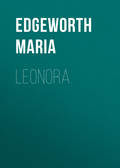
Edgeworth Maria
Practical Education, Volume II
Soon after S – had expressed his ardent wish to have another play performed, the trial of some poor man in the neighbourhood happened to be mentioned; and it was said, that the criminal had the choice of either going to Botany Bay, or being hanged.
S – asked how that could be. "I did'nt think," said he, "that a man could have two punishments. Can the judge change the punishment? I thought it was fixed by the law."
Mr. – told S – that these were sensible questions; and, as he saw that the boy's attention was fixed, he seized the opportunity to give him some general idea upon the subject. He began with telling S – the manner in which a suspected person is brought before a justice of the peace. A warrant and committal were described; then the manner of trying criminals; what is called the court, the jury, &c. the crier of the court, and the forms of a trial; the reason why the prisoner, when he is asked how he will be tried, answers, "By God and my country: " this led to an account of the old absurd fire and water ordeals, and thence the advantages of a trial by jury became more apparent by comparison. Mr. – told S – why it is called empannelling a jury, and why the jury are called a pannel; the manner in which the jury give their verdict; the duty of the judge, to sum up the evidence, to explain the law to the jury. "The judge is, by the humane laws of England, always supposed to be the protector of the accused; and now, S – , we are come round to your question; the judge cannot make the punishment more severe; but when the punishment is fine or imprisonment, the quantity or duration of the punishment is left to his judgment. The king may remit the punishment entirely; he may pardon the criminal; he may, if a man be sentenced to be hanged, give him his choice, whether he will be hanged or transported" – (the word was explained.)
"But," said S – , "since the judge cannot change the punishment, why may the king? I think it is very unjust that the king should have such a power, because, if he changes the punishment for one thing, why mayn't he for another and another, and so on?"
Mr. – . "I am inclined to believe, my dear S – , that it is for the good of a state, that a king should have such a power; but I am not sure. If any individual should have this power, I think it is most safely trusted to a king; because, as he has no connection with the individuals who are tried, as he does not live amongst them, he is not so liable as judges and jurymen might be to be prejudiced, to be influenced by personal revenge, friendship, or pity. When he pardons, he is supposed to pardon without any personal motives. But of all this, S – , you will judge for yourself, when you study the law. I intend to take you with me to – next assizes to hear a trial."
S – looked full as eager to hear a trial, as he had done, half an hour before, to act a play. We should mention, that in the little play in which he had acted, he had played the part of a justice of the peace, and a sort of trial formed the business of the play; the ideas of trials and law, therefore, joined readily with his former train of thought. Much of the success of education, depends upon the preceptor's seizing these slight connections. It is scarcely possible to explain this fully in writing.
(February 25th, 1797.) S – was reading in "Evenings at Home," the story of "A friend in need, is a friend indeed."
"Mr. G. Cornish, having raised a moderate fortune, and being now beyond the meridian of life, he felt a strong desire of returning to his native country."
S – . "How much better that is, than to say he felt an irresistible desire, or an insupportable desire, as people sometimes say in books."
Our pupils were always permitted to stop when they were reading loud, to make whatever remarks they pleased upon whatever books they read. They did not, by this method, get through so many books as other children of their age usually do; but their taste for reading seemed to increase rapidly. (V. Books.)
(March 8th, 1797.) H – (14) told us that he remembered seeing, when he was five years old, some puppets packed up by a showman in a triangular box; "and for sometime afterwards," said H – , "when I saw my father's triangular hat-box, I expected puppets to come out of it. A few days ago, I met a man with a triangular box upon his head, and I thought that there were puppets in the box."
We have taken notice of this propensity in children, to believe that particular, are general causes; and we have endeavoured to show how it affects the temper, and the habits of reasoning. (V. Temper, and Wit and Judgment.)
(March 27th, 1797.) Mr. – showed little W – (3 years old) a watch, and asked him if he thought that it was alive.
W – . "Yes."
Mr. – . "Do you think that the fire is alive?"
W – . "Yes."
Mr. – . (The child was standing at the tea table.) "Do you think the urn is alive?"
W – . "No."
Mr. – . "Do you think that book is alive?"
W – . "No."
Mr. – . "The horses?"
W – . "Yes."
Mr. – . "Do you think that the chaise is alive?"
W – . "Yes." Then, after looking in Mr. – 's face, he changed his opinion, and said no.
W — did not seem to know what was meant by the word alive.
Mr. – called H. (5 years old) and asked her whether she thought that the watch was alive. She at first said Yes; but, as soon as she had time to recollect herself, she said that the watch was not alive.
This question was asked, to try whether Reid was right in his conjecture as to the answers a child would give to such a question. (V. Reid's Essays on the Intellectual Powers of Man.)
We frequently say, that flowers, &c. are dead: we should explain to children that there are two kinds of life; or rather, that the word life is used to express two ideas; vegetable life, and animal life.
(July, 1797.) Miss Louisa – told us, that when a rose bud begins to wither, if you burn the end of the stalk, and plunge it red hot into water, the rose will be found revived the next day; and by a repetition of this burning, the lives of flowers may be fortunately prolonged many days. Miss Louisa – had seen many surprising recoveries performed by this operation, and several of her friends had adopted the practice with uniform success.
We determined to repeat the experiment. Children should never take any thing upon trust which they can verify. Two roses, gathered at the same time, from the same tree, were put into separate glasses of water. The stalk of one of these roses was burnt, according to prescription; they were left a night in water, and the next day the rose that had been burnt, appeared in much better health than that which had not been burnt. The experiment was afterwards several times repeated; and should be tried by others until the fact be fully ascertained.
(July, 1797.) Little W – (three years old) was shown Miss B – 's beautiful copy of the Aurora surgens of Guido. The car of Apollo is encircled by the dancing hours, so that its shape is not seen; part of one wheel only is visible between the robes of the dancing figures. We asked little W – why that man (pointing to the figure of Apollo in his invisible car) looked so much higher up in the air than the other people?
W – . "Because he is in a carriage; he is sitting in a carriage."
We pointed to the imperfect wheel, and asked if he knew what that was? He immediately answered, "Yes, the wheel of the carriage." We wanted to see whether the imagination of a child of three years old, would supply the invisible parts of the car: and whether the wheel and horses, and man holding the reins, would suggest the idea of a phæton. (V. Chapter on Taste and Imagination.)
We shall not trespass upon the reader's patience with any more anecdotes from the nursery. We hope, that candid and intelligent parents will pardon, if they have discovered any desire in us to exhibit our pupils. We may mistake our own motives, and we do not pretend to be perfectly impartial judges upon this occasion; but we have hoped, that only such conversations or anecdotes have been produced, as may be of some use in Practical Education. From conversation, if properly managed, children may learn with ease, expedition, and delight, a variety of knowledge; and a skilful preceptor can apply in conversation all the principles that we have laboriously endeavoured to make intelligible.







